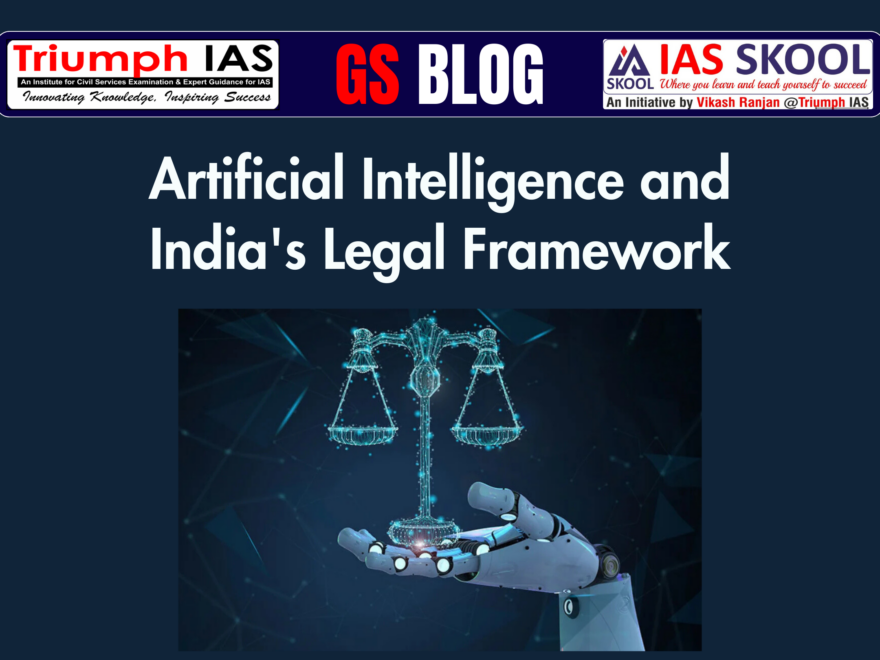Artificial Intelligence and India’s Legal Framework
India is rapidly advancing its AI-driven surveillance systems, integrating facial recognition and Artificial Intelligence technologies into law enforcement operations without robust legal safeguards. The existing regulatory framework, such as the Digital Personal Data Protection Act of 2023, provides broad exemptions for government agencies, raising concerns over potential infringements on individual privacy rights. In contrast to the European Union’s risk-based AI regulatory approach, India lacks a comprehensive legislative framework to oversee these technologies, leaving citizens exposed to unregulated data collection and threats to civil liberties.
How AI Technologies Can Strengthen India’s Legal Landscape?
Timely and Effective Delivery of Justice:
- AI can streamline case management by automating repetitive tasks such as documentation, case categorization, and scheduling, thereby accelerating judicial processes.
- With over 5 crores pending cases in Indian courts, AI-driven tools can help free up judges to focus on substantive legal matters.
- AI tools can analyze legal precedents and case laws, providing historical data to assist in informed decision-making and litigation strategy development.
- AI can facilitate evidence collection, verification, and analysis, particularly in complex cases involving extensive datasets, forensic evidence, or digital fraud.
For example, the National Forensic Sciences University in Gujarat employs AI to expedite the analysis of digital evidence in cybercrime investigations.
- Delhi’s Tis Hazari District Court has introduced an AI-enabled ‘Pilot Hybrid Court,’ equipped with a speech-to-text facility to enhance efficiency.
- AI-powered platforms simplify mediation and arbitration by automating communication and tracking negotiations. Platforms like ODR India use AI to facilitate online dispute resolution.
Enhancing Legislative Processes:
- AI can assist lawmakers in drafting, analyzing, and amending legislation by processing vast amounts of legal and public policy data.
- AI-driven simulations can predict the social, economic, and environmental impacts of proposed laws, improving their precision and relevance.
- For instance, tools like the European Union’s Legislation Editing Open Software (LEOS) integrate AI to enhance legislative drafting.
- AI-powered legal tools make it easier for non-lawyers to interact with legal professionals, speeding up processes and reducing the time needed for legal research and compliance analysis.
Improved Law Enforcement and Crime Prevention:
- AI enhances law enforcement by enabling predictive policing, real-time crime monitoring, and evidence analysis.
- Recently, Delhi Police used AI to reconstruct the face of an unidentified murder victim and displayed the image on posters to gather information about his identity. This approach not only led to the victim’s identification but also played a vital role in apprehending the perpetrators.
Facilitating Compliance with International Laws:
- AI simplifies compliance for multinational corporations by analyzing cross-border regulations and trade laws, making it easier for businesses to navigate complex legal landscapes.
- Automated compliance tools reduce the risk of penalties and enhance India’s ease-of-doing-business ranking.
- Companies like TCS and Infosys are developing AI-based compliance tools tailored to international trade agreements.
Strengthening Corporate Compliance:
- AI automates processes like monitoring, reporting, and filing, simplifying legal compliance for businesses operating across multiple jurisdictions.
- With India’s growing emphasis on ESG (Environmental, Social, and Governance) reporting, AI helps ensure timely compliance, reduces manual errors, and prevents violations.
- Companies can leverage AI to comply with SEBI’s ESG disclosure norms, streamlining the reporting process.
Improving Consumer Protection Mechanisms:
- AI can enhance consumer safety by processing complaints, monitoring fraudulent activities, and predicting market trends.
- With the rise of e-commerce and digital platforms, AI helps authorities efficiently address grievances and prevent fraud.
- The Consumer Protection Authority of India can utilize AI to track unfair trade practices and enhance consumer protection efforts.
Facilitating Environmental Law Enforcement:
- AI monitors environmental compliance by analyzing data from sensors, satellites, and field reports, ensuring adherence to regulations.
- AI tools can detect violations such as illegal mining or deforestation, enabling swift action by regulatory authorities.
- For instance, the Karnataka Forest Department identified 167 cases of encroachment within four months using AI-powered satellite imagery and analysis.
Strengthening Intellectual Property Rights (IPR):
- AI streamlines IPR processes by assisting with patent searches, drafting, and detecting copyright infringements.
- Automating complex searches and filings ensures faster patent approvals and minimizes disputes in IP-intensive industries like pharmaceuticals and IT.
- The U.S. Patent and Trademark Office (USPTO) has reported a rise in patent applications for AI-assisted inventions, offering a replicable model for India to adopt

AI Technologies Challenging India’s Legal Framework
Privacy and Data Protection Vulnerabilities:
- AI systems extensively collect, analyze, and monetize personal data, often lacking robust safeguards, thus threatening citizens’ privacy rights.
- While the Digital Personal Data Protection Act (2023) marks progress, it falls short of stringent enforcement, particularly concerning AI-driven surveillance.
- Facial recognition technology (FRT), extensively deployed in public spaces, such as by Hyderabad Police under the Smart Policing Mission, raises concerns about mass surveillance.
- India ranked second globally in cyber attacks (PwC 2022), with 40% of Indian firms using AI lacking adequate data security protocols (NASSCOM, 2023).
Bias and Discrimination in Algorithmic Decision-Making:
- AI systems often reinforce societal biases due to flawed datasets, leading to discriminatory outcomes in areas like hiring, lending, and policing.
- The absence of comprehensive guidelines for algorithmic fairness allows AI to perpetuate systemic inequalities, violating constitutional principles of equality.
- For example, AI-powered recruitment tools in India have disproportionately filtered out female candidates for tech roles.
- In 2018, Amazon discontinued its secret AI recruiting engine due to biases against women, but similar systems may still operate unchecked in India.
Intellectual Property Conflicts:
- AI challenges traditional intellectual property (IP) principles by complicating ownership claims for AI-generated works.
- India’s Copyright Act of 1957 requires human authorship for a work to be copyrightable, leaving AI-generated content unprotected.
- The Andersen v. Stability AI Ltd. case highlights the vulnerabilities of artists in the absence of clear copyright protections for AI-created works.
Economic Inequality and Labor Law Challenges:
- AI-driven automation poses a significant threat to employment, particularly in labor-intensive industries, exacerbating economic inequality.
- India’s labor laws, including the Four Labour Codes, fail to address job displacement caused by AI.
- A report by the McKinsey Global Institute estimates that automation could displace up to 60 million workers in India’s manufacturing sector by 2030, with industries like textiles and electronics being the most affected.
National Security Threats:
- AI misuse in cyber attacks, deep fakes, and misinformation campaigns jeopardizes India’s internal security.
- During the Lok Sabha Elections 2024, deep-fake videos were used to spread misinformation, threatening electoral integrity.
- In 2023, India saw a 15% increase in weekly cyber attacks per organization compared to 2022, highlighting vulnerabilities in critical sectors like banking and defense due to the lack of AI-specific cyber security regulations.
Ethical and Accountability Concerns:
- AI applications in healthcare, law enforcement, and public services raise ethical and liability issues, with errors by AI systems creating legal ambiguities.
- For instance, a JAMA study revealed that biased AI models reduced clinicians’ diagnostic accuracy by 11.3 percentage points, underscoring the risks of systematic bias in healthcare.
- The absence of clear accountability frameworks leaves disputes involving AI-driven errors unresolved.
Environmental Impacts of AI Deployment:
- The energy-intensive nature of AI training models exacerbates environmental challenges, contributing to rising carbon emissions.
- Training a large language model, such as ChatGPT-3, can consume as much as 10 gigawatt-hours (GWh) of electricity, equivalent to the annual energy consumption of a small town.
- India’s legal framework lacks mandates for sustainable AI practices, contradicting its commitments to climate change mitigation.
Steps to Strengthen AI Regulation and Ensure Responsible AI Usage in India
Enact Comprehensive AI-Specific Legislation:
- India requires dedicated laws addressing AI-related challenges, including ethical guidelines, accountability mechanisms, and risk classification.
- Drawing inspiration from the European Union’s AI Act (2024), India could implement a tiered risk framework for AI applications, adapted to local contexts.
Establish an Independent AI Regulatory Authority:
- Create a centralized body, such as the AI Ethics and Governance Authority of India, to oversee AI deployment, enforce compliance, and handle grievances.
- A dedicated regulator would ensure uniform AI governance across sectors, minimizing fragmentation and misuse.
- The UK’s Centre for Data Ethics and Innovation serves as a model for promoting ethical AI use.
Mandate Algorithmic Accountability and Audits:
- Introduce legal requirements for AI developers to conduct regular algorithm audits, ensuring detection of biases, inefficiencies, and ethical violations.
- Algorithmic biases in hiring, lending, or policing can lead to systemic discrimination if not addressed.
- For instance, in 2023, the Competition Commission of India raised concerns about price discrimination caused by algorithmic pricing on e-commerce platforms.
- Implement Bias Impact Assessments (BIA) and Explainability Standards in critical sectors like healthcare and finance as part of AI lifecycle management.
Strengthen Cyber security Regulations for AI Systems:
- Establish stringent cybersecurity standards for AI applications to safeguard sensitive data and counter AI-driven cyber threats.
- CERT-In should mandate regular vulnerability assessments and deploy AI-specific threat monitoring systems to mitigate risks effectively.
Promote Responsible AI Use Through Regulatory Sandboxes:
- Expand the adoption of regulatory sandboxes, enabling controlled testing of AI innovations while ensuring safety and compliance.
- These sandboxes support iterative refinement of AI technologies without posing large-scale risks.
- Cross-sectoral sandboxes under NITI Aayog can be established to test AI applications in healthcare diagnostics, smart cities, and environmental monitoring.
Integrate Ethical AI Principles into Education and Training:
- Include ethical AI development and responsible deployment in higher education curricula and corporate training programs.
- Educating developers and decision-makers on AI ethics would ensure future technologies prioritize inclusivity and fairness.
- Make AI ethics training mandatory for all government-funded AI projects and incentivize private firms to adopt similar practices.
Ensure Data Transparency and Access Control:
- Enhance transparency in AI systems by requiring mandatory disclosures on data usage, model training, and decision-making processes.
- Transparency would prevent black-box decision-making, improving public trust in AI systems.
- Amend the DPDP Act (2023) to include Right to Explanation provisions, enabling users to understand AI-driven outcomes that impact them.
Incentivize Green AI Practices:
- Encourage the development of energy-efficient AI systems to mitigate their environmental impact.
- Training large AI models consumes substantial energy, contradicting India’s commitments under the Paris Agreement.
- Provide tax benefits to AI firms adopting green computing practices and establish benchmarks for sustainable AI development.
While AI has the potential to transform multiple sectors in India, its rapid adoption brings critical challenges related to privacy, accountability, and bias. While regulating AI is essential, it should not come at the expense of innovation. The current legal framework, including the Digital Personal Data Protection Act (2023), requires significant enhancement to tackle the distinct issues posed by AI technologies. India must enact comprehensive AI-specific legislation, establish dedicated regulatory authorities, and encourage the adoption of ethical AI practices to protect citizens’ rights effectively.
The End of the Blog: Artificial Intelligence and India’s Legal Framework

|

















